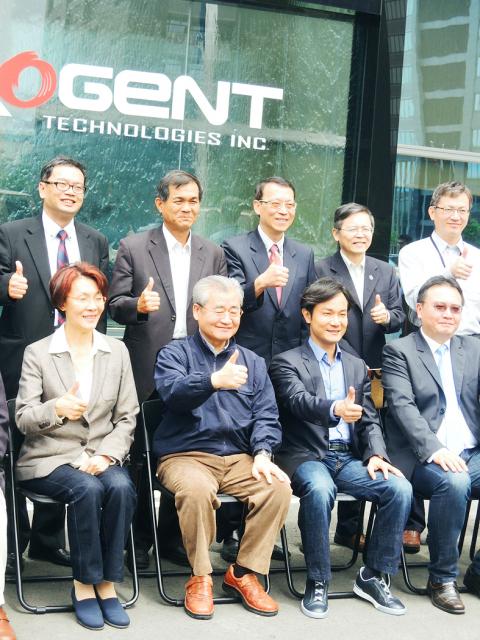Kaohsiung City Government officials yesterday rebutted Premier Mao Chih-kuo’s (毛治國) comments that southern Taiwan lacked job opportunities in the high-tech sector, saying the central government must shoulder some of the blame.
When visiting the Kaohsiung Software Park and experiencing first-hand some of the products yesterday, Mao said that a friend living in southern Taiwan told him that his son had recently gained a university degree but was unable to find a job in the technology industry in southern Taiwan.
The friend said that if his son looked for a job in northern Taiwan, he would have to dip into his retirement fund to help, Mao said, adding that his friend asked whether the government would be able to do something about the matter.

Photo: Ke Yu-hao, Taipei Times
Kaohsiung Deputy Mayor Hsu Li-ming (許立明), the city’s Economic Development Bureau Director Tseng Wen-sheng (曾文生) and a number of southern Taiwan university deans, present at the talk, appeared unhappy on hearing the comment.
Mao went on to say that he hoped Brogent Technologies, the booth he was visiting at the time, would help the nation find its path in the information technology industry, adding that he hoped the nation’s information and communication technology companies would step up its transition to add value to the industry.
After the event, Tseng, in response to reporters’ questions about Mao’s comments, said that Kaohsiung has made great strides in improving the performance of its industries, adding that as industrial planning and development policies were in the hands of the central government, it was also responsible for the lack of high-tech industry firms based in southern Taiwan.
A member of the public attending the event added that the Chinese Nationalist Party (KMT), had designated Kaohsiung as the nation’s main area for the petrochemical and iron industries, adding that any move toward high technology was after the city government developed the software park.
“The premier’s comments come as a slap in the face to the local government as well as to his own [central government],” said the member of the public who declined to be named.
Kaohsiung’s National Sun Yat-sen University dean Yang Hung-tun (楊弘敦) said that the industrial sector is beginning to take shape in the city, adding that 25 junior colleges as well as 10 to 20 businesses have formed an association to help students find jobs in the industry.
“We hope that students from southern Taiwan will be encouraged to stay and will not have to go to Taipei just to find a job,” Yang said.
Meanwhile, Kaohsiung City Councilor Lee Po-yi (李柏毅) of the Democratic Progressive Party (DPP) said that when Kaohsiung was rocked by the gas pipeline explosions last year, Mao, then-vice premier, did not visit, adding that since Mao became premier earlier this year, he had only visited the municipality two or three times.
“A premier who is not concerned about Kaohsiung is in no position to make such comments,” Lee said, adding that “Mao should be working with Kaohsiung and formulating policies that help the municipality’s high-tech industry find its footing instead of offering criticism.”

CHANGING LANDSCAPE: Many of the part-time programs for educators were no longer needed, as many teachers obtain a graduate degree before joining the workforce, experts said Taiwanese universities this year canceled 86 programs, Ministry of Education data showed, with educators attributing the closures to the nation’s low birthrate as well as shifting trends. Fifty-three of the shuttered programs were part-time postgraduate degree programs, about 62 percent of the total, the most in the past five years, the data showed. National Taiwan Normal University (NTNU) discontinued the most part-time master’s programs, at 16: chemistry, life science, earth science, physics, fine arts, music, special education, health promotion and health education, educational psychology and counseling, education, design, Chinese as a second language, library and information sciences, mechatronics engineering, history, physical education

The Chinese military has boosted its capability to fight at a high tempo using the element of surprise and new technology, the Ministry of National Defense said in the Quadrennial Defense Review (QDR) published on Monday last week. The ministry highlighted Chinese People’s Liberation Army (PLA) developments showing significant changes in Beijing’s strategy for war on Taiwan. The PLA has made significant headway in building capabilities for all-weather, multi-domain intelligence, surveillance, operational control and a joint air-sea blockade against Taiwan’s lines of communication, it said. The PLA has also improved its capabilities in direct amphibious assault operations aimed at seizing strategically important beaches,

The High Prosecutors’ Office yesterday withdrew an appeal against the acquittal of a former bank manager 22 years after his death, marking Taiwan’s first instance of prosecutors rendering posthumous justice to a wrongfully convicted defendant. Chu Ching-en (諸慶恩) — formerly a manager at the Taipei branch of BNP Paribas — was in 1999 accused by Weng Mao-chung (翁茂鍾), then-president of Chia Her Industrial Co, of forging a request for a fixed deposit of US$10 million by I-Hwa Industrial Co, a subsidiary of Chia Her, which was used as collateral. Chu was ruled not guilty in the first trial, but was found guilty

DEADLOCK: As the commission is unable to forum a quorum to review license renewal applications, the channel operators are not at fault and can air past their license date The National Communications Commission (NCC) yesterday said that the Public Television Service (PTS) and 36 other television and radio broadcasters could continue airing, despite the commission’s inability to meet a quorum to review their license renewal applications. The licenses of PTS and the other channels are set to expire between this month and June. The National Communications Commission Organization Act (國家通訊傳播委員會組織法) stipulates that the commission must meet the mandated quorum of four to hold a valid meeting. The seven-member commission currently has only three commissioners. “We have informed the channel operators of the progress we have made in reviewing their license renewal applications, and